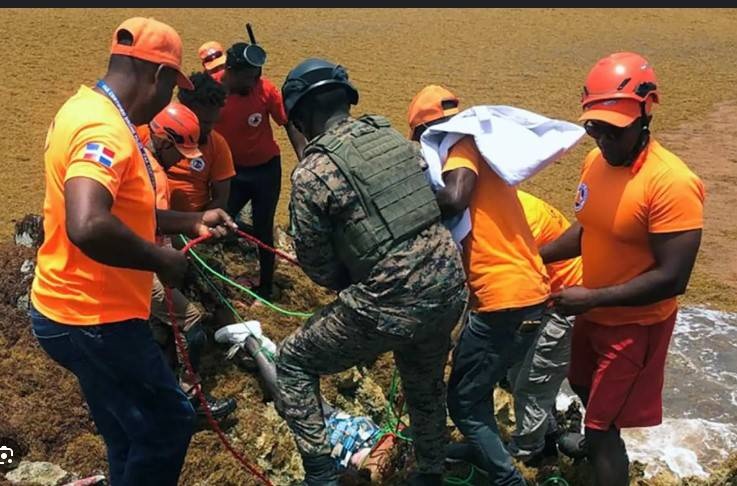At least four people have died and around 20 remain missing after a migrant boat capsized off the coast of the Dominican Republic, highlighting the continued risks taken by Haitians and Dominicans desperate for a better life.
The tragic incident occurred as the vessel was en route to Puerto Rico, a U.S. territory often seen as a gateway to opportunity.
Authorities reported that the vessel, believed to be carrying about 40 individuals, overturned in the waters of the Caribbean.
According to the Dominican Republic’s civil defence authority, 17 survivors have been rescued so far.
Of those saved, 10 were Dominicans and seven were Haitians. Among the rescued was a child, officials confirmed on Friday.
The capsized vessel was one of many small, unsafe boats known locally as “yolas.”
Typically made from wood or fibreglass, these makeshift vessels are not built to withstand long maritime journeys and rarely meet even basic safety standards.
Despite the risks, they remain the primary mode of travel for many who attempt the perilous journey from the Dominican Republic to Puerto Rico.
The journey is often orchestrated by human smugglers, and migrants can be charged up to $7,000 for a single trip across the sea.
The high cost, combined with the extreme danger, underscores the desperation felt by many in both the Dominican Republic and neighbouring Haiti.
In both countries, political instability, economic collapse, and widespread violence continue to drive migration.
Illegal crossings between the Dominican Republic and Puerto Rico have surged in recent years.
Many of the boats aim to land on Mona Island, an uninhabited nature reserve located between the two territories.
Though protected, the island has become a frequent waypoint for smugglers transporting both Haitian and Dominican nationals attempting to reach U.S. soil.
This latest incident is one in a string of tragedies involving migrant boats in the region.
In 2022, five people drowned and 66 others were rescued after a suspected human smuggling vessel ran into trouble near Mona Island.
That event prompted renewed calls from humanitarian groups and regional governments for stronger enforcement against trafficking networks and greater support for those fleeing poverty and violence.
Despite such warnings, the flow of migrants shows little sign of slowing.
The Dominican Republic, while economically better off than Haiti, still struggles with high unemployment and deep social inequality.
Meanwhile, Haiti continues to face widespread humanitarian crises, with armed gangs controlling large swaths of the country and basic services collapsing in many areas.
For many, the crossing to Puerto Rico represents a final hope, however dangerous, for safety, employment, and a better future.
“They are willing to risk everything,” said a local humanitarian worker familiar with the situation.
“They’re escaping situations that they see as hopeless.”
Officials are continuing their search for the missing individuals, though hopes of finding more survivors are fading with time.
Rescue efforts have been hampered by rough sea conditions and limited resources.
The Dominican navy, working in coordination with civil defence teams, has launched an investigation into the incident.
Authorities believe that human traffickers may be involved, though no arrests have been announced at this time.
The government has urged people not to trust smugglers and warned of the dangers of illegal sea crossings.
Still, as economic and political pressures intensify across Hispaniola, such messages are often drowned out by desperation.
Human rights advocates have called for more comprehensive regional solutions to address the root causes of migration and improve protections for those attempting the journey.
“This isn’t just a Dominican or Haitian issue, it’s a regional crisis,” said one activist.
“Unless conditions improve at home, people will keep risking their lives at sea.”
As families mourn the dead and authorities continue the search for the missing, this tragedy serves as another grim reminder of the human cost of forced migration in the Caribbean.




